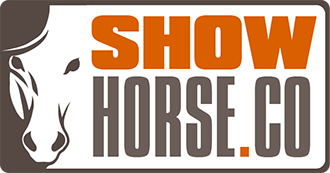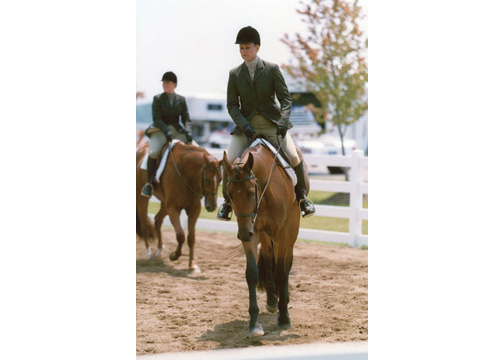Real-World Goals
April 10, 2013
You’re not going to win the World this year. Can you still have a good horse-showing season?
People who don’t win world championships can still have productive, successful, fun-filled horse-show seasons.Journal photo.
From The American Quarter Horse Journal
Let’s face some unpleasant facts. Fact one: only a few people winworld championships with their horses each year. Fact two: This year, that’s not likely going to be you.
So far, these facts are probably disappointing.
But here’s another fact: People who don’t win world championships can still have productive, successful, fun-filled show seasons. How? They set realistic goals.
Hard Truths
To set some realistic goals for your show season, you’re going to need to start with an honest evaluation on whether you canachieve those goals.
That’s where AQHA Professional Horsemen Harriet and Ken Link of Woodville, Wisconsin, start, even if it’s hard for the client to hear.
“One of the first things we do with a new client, or even with our established clients as we begin a new year or start with a new horse, is we discuss goals – what is realistic for the horse vs. the results the owners are expecting,” Harriet says. “Our priority lately has been halter horses. We have new prospects coming into the barn all the time. In many cases, Ken will actually make barn calls to look at the prospects before having them brought to our facility. There are two things we look at immediately. One is the cost factor. Does the client have a good idea of how much it’s going to cost just considering the basics of stalls, entry fees and mileage?
“Then we look at the individual and the horse. Generally, you can make an individual into a good exhibitor, but you need a caliber of horse that is going to be capable of doing what the exhibitor wants to do with it.”
If the horse is good enough to get the rider through novice ranks or show on the local level, but the quality is not adequate to go farther, Harriet tells the exhibitor to enjoy the experience but be prepared to buy another prospect later on if he or she wishes to raise the level of competition.
So take a good long look at your horse – and set your target accordingly.
Is completing a perfect trail pattern one of your goals? If it is, then theAQHA “Showing to Win: Trail” DVD is perfect for you. This helpful and informative video will show you the trail scoring system and what the judges are looking for in a trail pattern. You’ll be one step closer to reaching your goals with this DVD!
Need some help with your horse evaluation?
Ask a professional for assistance, especially if you’ve never purchased a horse before or lack experience in the show ring.
“It’s like learning to dance or bowl or shoot archery,” Harriet says. That professional eye has been trained in what to look for.
“I think where people get themselves in the deepest trouble is buying something and then finding that it’s not going to work for their purpose,” Harriet says.
Making Friends
Going to a horse show with a must-win attitude isn’t a winner. Horse shows should be about fun, Harriet says.
“You need to take the ‘winning’ word out of horse shows,” Harriet says. “First of all, this is generally a hobby, and for a youth or amateur, it is a social event. (Exhibitors) should have a good time doing it. They should be creating friendships with other exhibitors and sharing the entire experience.”
AQHA Professional Horsewoman Nancy Cahill, of Madisonville, Texas, agrees.
“You can read interviews with everyone from kids who are showing to top professionals, and they will tell you that besides the horses themselves, the neatest part is the people you meet,” Nancy says. “I’ve always told parents that showing horses is like a microcosm of the world: It gives you happy. It gives you sad. It gives you excitement. It gives you disappointment. It gives you life. It gives you death. It gives you everything. In this little world, you experience it all with people surrounding you who care.”
Don’t be afraid of your fellow competitors, Nancy says. They’re going to make you better.
“You’re only as good as your competition,” Nancy says. “There are shy people, and there are confident people, and they’ll all show a little differently, but they all want to reach the same goal – to be a good horseman.”
Not that competition isn’t important.
“We wouldn’t be in this business unless we were competitive,” Harriet says, “but that doesn’t necessarily mean we expect to win all the time. As professionals, the goal is to get as close to the top of that class as we can. We know the limitations of the individuals we are exhibiting, and we have realistic expectations as to how well we could/should do. For a beginner, especially a true novice, whether adult or child, it’s theexperience. Just partaking in that event and taking learned lessons away from each class is of primary importance.”
In the “Showing to Win: Trail” DVD, AQHA teamed with some of the best-known and well-respected AQHA Professional Horsemen, judges and exhibitors in Charlie Cole, Leslie Lange and Jim Searles, who walk viewers through the required parts of the pattern and explain the maneuver scores, pluses and minuses.
So in the spirit of partaking of the experience, don’t be afraid to talk to show industry leaders, Nancy says.
“I just don’t know any professionals who would be rude,” she says. “They might say, ‘Can I get with you in a minute; I’m fixing to show,’ but they want more people in the industry, too. Without you, they don’t have a job, so don’t be afraid, at the proper time, to walk up to any professional you respect and ask for a tip or directions or ‘Do you know what class is in the arena?’ They’re not icons. They’re people who started just like you.”
Small Steps
Spending time with your horse and improving your skills are two more realistic goals, Harriet says.
Nancy endorses those goals.
“If you don’t enjoy the journey, the day-to-day liking horses, I don’t see how the goal means anything to you once you get there,” she says. “Of course, it’s easier for some people than others, but the road getting there – the people you meet, the horses you ride, the riders you look up to – are probably more important to me than the goals itself.”
Probably you’ve seen pictures of the World Show trophy. It’s tempting, that’s for sure.
“Even the true beginner at some point is going to look at (the World Show) and say ‘Gee, I’d like to do that someday,’ ” Harriet says.
It’s not a goal that can easily be reached in a first year of competition.
Nancy suggests that for the first year, especially, you concentrate on one extremely important goal: a clean ride.
“If you don’t check your nervousness at the gate, the horse is going to read that,” she says. “He’s going to go, ‘What’s the problem? There’s something wrong here. What did I do wrong? What is it I’m supposed to be afraid of?’ because the rider tensed up. The horse is scared, and you’re not riding him like you do every day.
“Just keep going in there. Yes, to place is your goal, but without the ride, chances are you’re not going to place. You’ve got to give the judge the standard. You’re trying to give him what he is looking for.”
Placing is gravy, she says, and you might or might not be rewarded for your efforts. But the clean ride speaks for itself.
“Doing our best is the best goal,” Harriet says.
What Can You Do?
So let’s assume you’ve got your nerves under control, you’ve made new friends and you’ve bonded with your horse. What else can you do?
There are worthy – and achievable – objectives to make that first year feel like more of a success, Harriet says.
“How about earning a Register of Merit in one event?” she suggests. “Then, if we get the ROM in one event, is it possible to get it in another one? Let’s feel good about those small steps.”
An achievable goal gives exhibitors something to work toward, Harriet says, and something to feel satisfaction about. That’s no small potatoes.
The “Showing to Win: Trail” DVD is the perfect addition to the beginner rider or the more advanced horseman looking to improve his or her riding skills and knowledge. The DVD illustrates the standards and provides information exhibitors need to successfully get through a trail pattern and onto the judge’s score card.
As a bonus, an ROM on a horse’s official AQHA record can increase the value of the horse.
If you’re a true beginner, look into the Rookie program as a way to compete with others on your experience level.
Or consider working toward your Regional Championship, Harriet says
“It gives folks an opportunity to experience (AQHA showing) without some of the higher-powered horses and exhibitors to intimidate them,” Harriet says.
To learn more about the Regional Championships, go to www.aqha.com/showing.
Many AQHA affiliates, such as the Rocky Mountain Quarter Horse Association in Colorado, offer year-end awards programs, and competing at weekend shows associated with those groups can give you the chance to win prizes.
The RMQHA was established in 1946 and has been offering year-end awards since the 1960s, says former executive secretary Gretchen Boling.
The initial year-end celebration with prizes for just a few classes has grown into a presentation that celebrates all Quarter Horse activity, from trail riding to racing to showing in all age divisions. Shows with RMQHA approval contribute money back to the group for the year-end prizes, which have included such items as buckles, buckets, letterman-style jackets and tack store gift certificates, Gretchen says.
It’s all an effort to make exhibitors understand the programs are “for everybody, and that we share your glories, whether you are a race or show person,” Gretchen says.
All it takes is making an effort to join and participate.
The Minnesota Quarter Horse Association is one of the affiliates that has a year-end state program, Harriet says, and even if exhibitors don’t earn AQHA points in a particular class, they still can earn state points.
“If a young person comes out of a class and he has beat five or six other exhibitors, he has five or six state points,” Harriet says. “He should be proud of that.”
To learn more about affiliates and find one for your state, go to www.aqha.com/aboutand scroll to the bottom of the page.
Whichever path you choose, it’s time to get your horse in the trailer and start making some of those goals realities.


